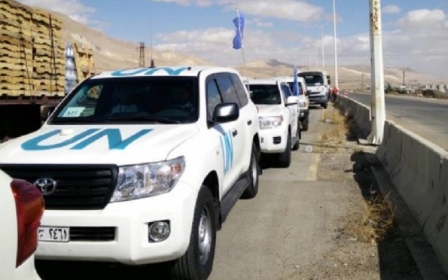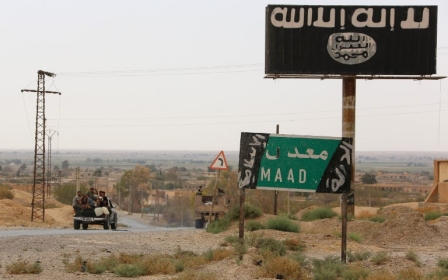Syrian opposition rejects Russia-sponsored congress
Syrian opposition representatives have said they will not participate in peace negotiations in Astana, as Moscow seeks to launch a new initiative to end the Syrian conflict.
The Syrian National Coalition, a group fighting the Syrian government, said on Wednesday it opposed the Russian-sponsored congress of Syrian groups, calling it an attempt to circumvent UN-backed Geneva peace talks that aim for a political transition for the war-torn country.
"The Coalition will not participate in any negotiations with the regime outside Geneva or without UN sponsorship," SNC spokesman Ahmad Ramadan told Reuters.
"Russia's call for a conference for Syrians in Sochi is an attempt to circumvent Geneva and the international desire for a political transition in Syria in accordance with UN security council resolutions," the Turkey-based SNC said.
The Turkish government also called "unacceptable" the decision by Russian to invite the Kurdish-led authorities in northern Syria to the negotiations.
A Kurdish official told Reuters that Moscow had extended an invitation to the talks.
"We are studying the issue and our stance has been positive so far," Badran Jia Kurd, an adviser to the administration that governs Kurdish-led autonomous regions of Syria, told Reuters.
It would mark the first time Syria's main Kurdish groups have been brought into peace talks. Although they now control at least a quarter of Syria, Kurdish authorities have so far been left out of international talks in line with Turkish wishes.
After intervening decisively in favour of Syrian President Bashar al-Assad, Russia has sought to spearhead diplomatic efforts among the various combatants over the past year. Moscow has said the congress will focus on "compromise solutions" towards ending the conflict, which began more than six years ago with street protests against the Syrian leader.
A spokesman for the Syrian opposition, which wants peace talks to take place under UN supervision, described the proposed congress as "really worrying". It was unclear what the aims were and who would join, said Yahya al-Aridi.
Aridi also said he feared the congress would be used as "fabricated" evidence of reconciliation to mislead both the Syrians and foreign countries.
Several rounds of UN talks in Geneva between the Damascus government and the anti-Assad opposition have gone nowhere.
Russia invited 33 Syrian groups and political parties on Tuesday to a "Syrian Congress on National Dialogue" which it will host on 18 November in the Black Sea resort of Sochi.
They include Kurdish groups and anti-Assad rebel factions.
The Kurdish-led administration received the invitation at meetings with Russian officials in northern Syria last month and favour the idea as it strives for a political solution, Jia Kurd said. Kurdish officials say they have been in talks with Russia to assess the prospects for dialogue with the Syrian government.
Since 2011, the Syrian Kurdish YPG militia and its allies have carved out autonomous cantons in the north. Their territorial grip has expanded since they joined forces with the United States to fight Islamic State militants.
But Turkey views Syrian Kurdish power as a national security threat along its border. Ankara considers the YPG as an extension of the outlawed Kurdish PKK movement that has waged a three-decade insurgency inside Turkey.
Russian President Vladimir Putin, who sent warplanes to help Assad's military against mostly Sunni rebels in 2015, first mentioned the congress earlier this month.
Putin has said it would include "all ethnic and religious groups, and the government, and the opposition".
Syria's UN ambassador, Bashar al-Jaafari, said Damascus was ready to take part in the congress and that the time was now more appropriate to join such talks after its military victories.
Since Russia's intervention in 2015, the government has taken back significant territory from rebels opposed to Assad and has this year recaptured swathes of central and eastern Syria from Islamic State.
Alexander Lavrentyev, a senior Russian negotiator on Syria, urged Syrian rebel groups to join the congress, provided they support Syria's integrity and sovereignty and status as a secular, democratic state.
"If someone is against these principles,.. they will of course not go there," he told reporters after a round of talks with Turkish and Iranian delegations in Kazakhstan. "But then we think they will risk being sidelined in the political process."
The Kazakhstan talks did not produce an anticipated document on prisoner swaps. Lavrentyev said the sides had spent a lot of time discussing the situation in Idlib where Damascus accuses Ankara of acting in coordination with Islamist militants.
Middle East Eye propose une couverture et une analyse indépendantes et incomparables du Moyen-Orient, de l’Afrique du Nord et d’autres régions du monde. Pour en savoir plus sur la reprise de ce contenu et les frais qui s’appliquent, veuillez remplir ce formulaire [en anglais]. Pour en savoir plus sur MEE, cliquez ici [en anglais].




